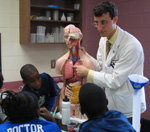|
The
Interprofessional Service Learning Project (ISLP), brings together
students from multiple colleges and programs (i.e., medicine, pharmacy,
physician assistant, health administration, nutritional sciences) to
work together as an interprofessional education team in a community
health project focusing on youth obesity.
 MUSC
College of Medicine student and MUSC Junior Doctors of Health
participant Stephen Finley discusses human body functions with students
of Mitchell Elementary. When Hughes spoke with the children, one of the
main topics involved Halloween candy and what happens to the body when
too much is eaten. MUSC
College of Medicine student and MUSC Junior Doctors of Health
participant Stephen Finley discusses human body functions with students
of Mitchell Elementary. When Hughes spoke with the children, one of the
main topics involved Halloween candy and what happens to the body when
too much is eaten.
Funded
by The Duke Endowment and a partner with MUSC’s Junior Doctors of
Health (JDOH) Program, ISLP works with students at Mitchell Elementary
school on the Charleston peninsula as well as students at other school
and community sites across the state.
ISLP’s goal is to provide health professions students with
collaborative, interprofessional learning experiences designed to
increase their knowledge and skills in the areas of health promotion
and disease prevention.
Students learn to apply team skills during community service
experiences and acquire knowledge of other professions through didactic
sessions and teamwork while on rotations facilitated by the South
Carolina Area Health Education Consortium system.
Using the JDOH curriculum, ISLP participants measure the health status
of elementary school students by having the students record their fruit
and vegetable intake and physical activity (pedometer steps). The
elementary students become Junior Doctors of Health, empowered to take
control of their own health and to educate others on the importance of
healthy eating and exercise. Students learn about a variety of health
professions from the diverse group of ISLP participants and are
encouraged to pursue future career choices in health care. In addition
to teaching, ISLP participants record their own eating and physical
activity habits, demonstrating the importance of role modeling in
increasing awareness of health behaviors.
For example, a fifth grade class at Mitchell Elementary recently
rotated through three learning stations the day before Halloween:
Healthy Snack and Food and Exercise Log, JDOH Review Booklet and the
Human Body Model. Winners were also announced for the students who
recorded eating the most vegetables and logging the most steps with
their pedometers. Students received a certificate recognizing them as a
Junior Doctor of Health and encouraged them to share the knowledge with
friends, family and communities.
As a result of participation in ISLP, health professions students are able to:
- Recognize the value
of interprofessional health care collaboration while participating in a
community health service learning project.
- Recognize sociocultural elements relevant to community and individual health.
- Discuss ways to address youth obesity through nutrition and physical fitness.
ISLP
rotations are offered throughout the academic year in all four South
Carolina AHEC regions of the state—in elementary schools, local
hospitals and community centers.
Friday, Nov. 13, 2009
|



